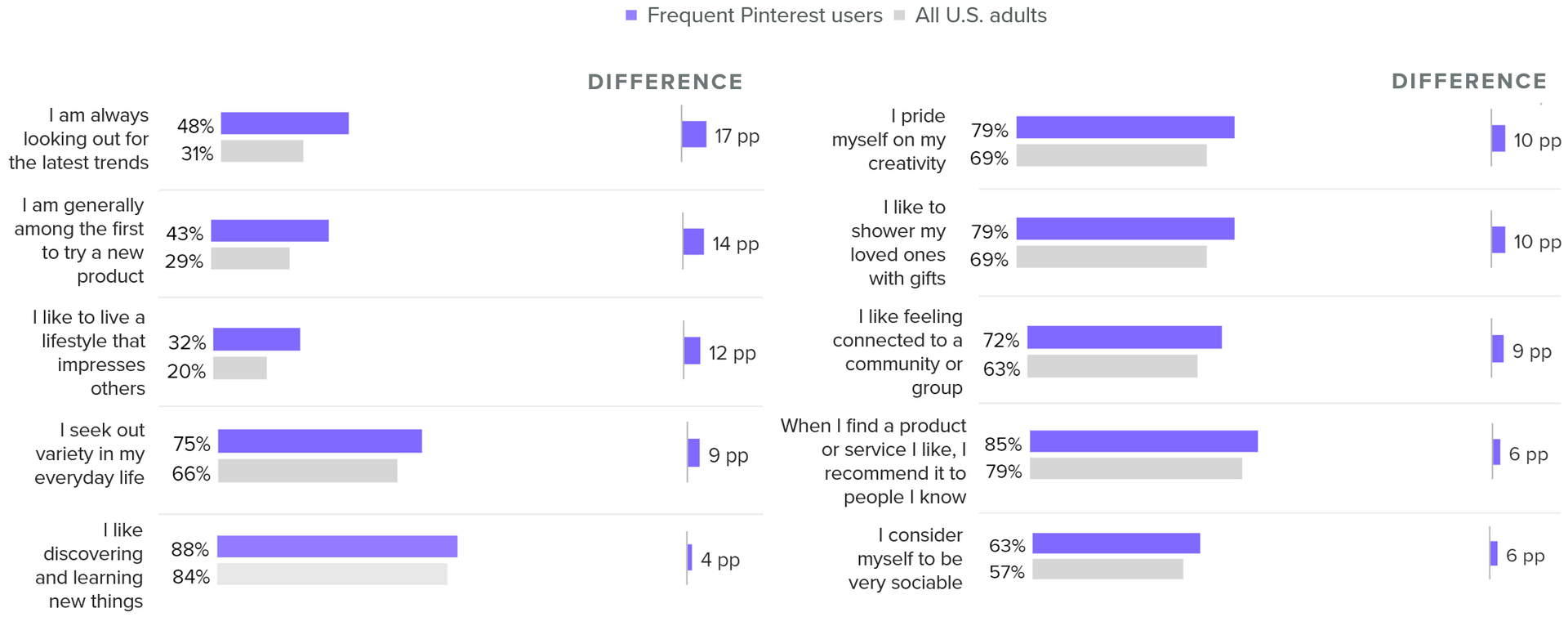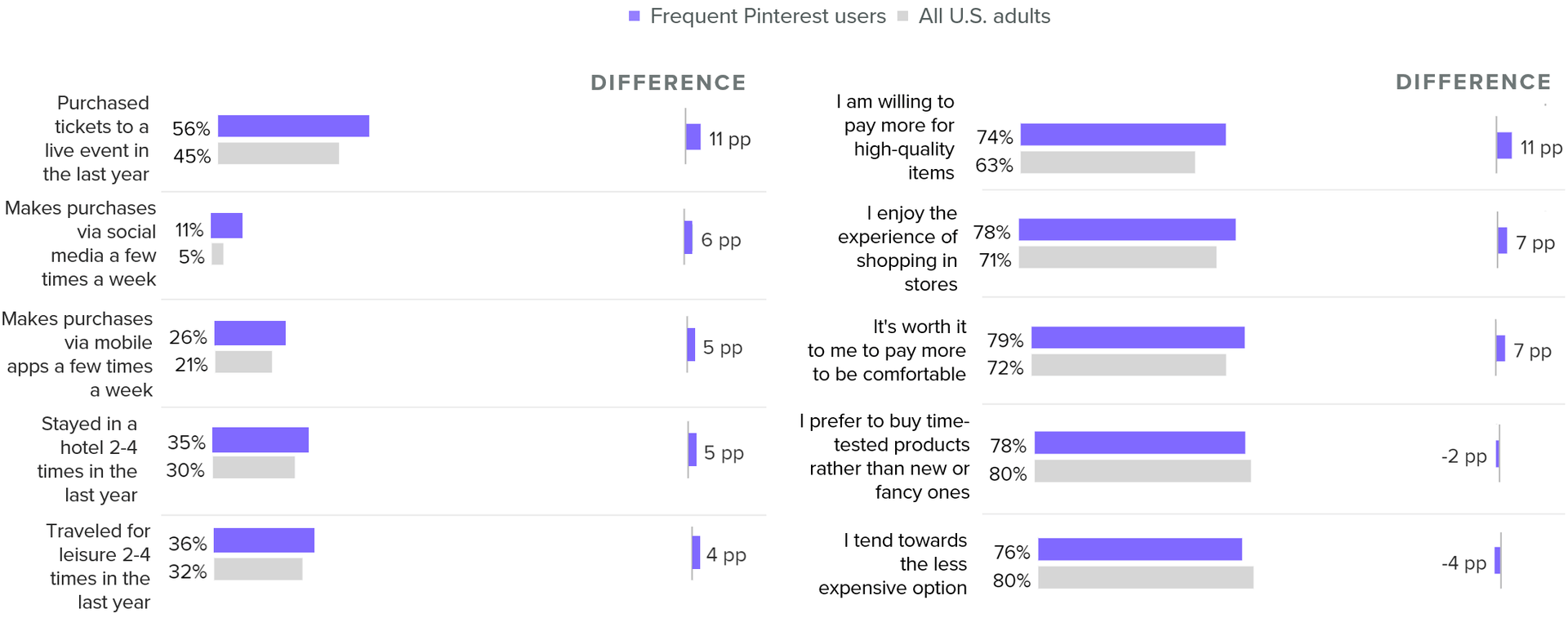The Untapped Marketing Power of Pinterest Users

Key Takeaways
A deep dive into thousands of survey responses reveals that frequent Pinterest users — those who engage with the platform at least once weekly — share several psychographic and behavioral similarities with social media influencers, as defined by previous Morning Consult research.
Members of the cohort serve as cultural arbiters for their in-person communities in a number of ways, including by being likely to try new products and recommend them to others, regularly hosting social gatherings and keeping an eye on emerging trends.
While Pinterest might not be known for producing mega-influencers, its power users’ penchant for dictating real-life taste makes it deserving of marketers attention and investment, especially as other platforms face mounting regulatory and media scrutiny.
In marketers’ rush to capitalize on the growing appeal of social media influencers in recent years, TikTok, Instagram and YouTube have served as primary activation playgrounds. And for good reason — they attract hordes of young people eager to both influence and be influenced. But with TikTok’s future becoming increasingly uncertain, brands are on the lookout for alternative ways to reach these first-mover consumers.
Morning Consult’s Audience data — which draws on millions of survey interviews about demographics, psychographics and consumption habits collected daily in more than 40 countries — suggests users of another platform, Pinterest, may possess a similar (though far less tapped) kind of marketing magic.
We zeroed in on domestic data for this memo, and found that — while most are not traditionally internet famous — people who use the image-sharing app at least once weekly share many traits with social media influencers, only they exhibit them in what is perhaps an even more valuable channel: real life.
Frequent Pinterest users skew younger, urban and wealthy
Frequent Pinterest users are more likely than the general population to make at least $100,000 per year (19% vs. 17%, respectively) and to have investments of $50,000 to $500,000 (70% vs. 67%).
These differences might seem small to those unfamiliar with survey research, but our large sample size — 13,744 responses gathered between April 2023 and April 2024 — means the margin of error is +/- 0.8 percentage points.
Frequent Pinterest Users' Income and Investments

Most members of the cohort are employed, though they are 7 percentage points more likely to work remotely than all U.S. adults. Frequent Pinterest users also over-index on women (59% vs. 51%), Gen Z adults (24% vs. 15%), millennials (35% vs. 28%) and urban dwellers (34% vs. 30%).
Things are quite sunny on the wellness front for this group, too. Compared to the general population, notably larger shares rate their health as "excellent" or "very good."
These characteristics — youth, wealth, health — are, in many ways, reflective of what Morning Consult defined as the ideal influencer through previous consumer research: someone who "offers a vision of your life, but slightly better."
And the same is true of the psychographic drivers that motivate frequent Pinterest users’ behavior.
Frequent Pinterest users are social movers and shakers
Access to novelty and variety is a core value for this audience, compelling them to keep an eye out for the latest trends and be among the first to try new products or services. They are also quite community-oriented, with things like sociability and feeling connected to a group being more important to frequent Pinterest users than to all U.S. adults.
These interests often merge through some of the cohort’s other affinities, like giving gifts and making recommendations to peers. As such, frequent Pinterest users make great supplemental targets for PR gifting, a marketing tactic that is still mostly reserved for online influencers with large followings. After all, word-of-mouth from friends and family remains consumers’ most trusted source for product information — and giving to less public individuals may limit the possibility of backlash or waste.
Frequent Pinterest Users’ Motivators

Additional qualities that frequent Pinterest users over-index on relative to the general population include a desire to learn new things, regularly hosting parties and the consumption of most kinds of media — from legacy journalism outfits such as The New York Times and The Wall Street Journal to pop-culture properties like HBO and all major sports leagues.
In short, they’re the tastemakers of their real lives. They engage with the world around them, collect ideas and create spaces to share them with others, all behaviors that consumers believe are central to the work of social media influencers, according to our 2023 Influencer Report.
And if members of this "power Pinterest" cohort spend their time like influencers, they definitely spend their money like them, too.
Frequent Pinterest users consume more than most
This group is partaking in most leisure activities more often than the average U.S. adult, including going to live events, staying in hotels, traveling, and shopping online or through mobile apps. But they’re not pinching pennies.
Frequent Pinterest users report being more willing than all U.S. adults to pay a premium for high-quality items or comfort. Unsurprisingly, they’re also likelier to have had elevated consumer experiences such as flying first class or frequently using meal delivery services.
In fact, one of the few attitudes this cohort under-indexes on is "tending toward less expensive options," further demonstrating their commitment to luxury-leaning lifestyles. Of course, social media influencers have come to be known for a similar opulence.
Frequent Pinterest Users’ Shopping Profile

But while frequent Pinterest users’ consume often across several categories and at premiums, brands should be aware: they’re not always a loyal bunch. The cohort slightly under-indexes on a preference for "time-tested" products and, again, has a deep-seated penchant for all things novel.
That said, the potential value of establishing a connection with this audience should not be discounted. As major influencer destinations like TikTok face growing regulatory threats, knowing where to reach those influencing tastes at the local, in-real-life level is more important than ever.
Pinterest is also well-positioned to be resilient should any significant backlash against social media ever take widespread hold. Because it doesn’t emphasize news content or comment sections, the platform doesn’t have strong associations with many of the negative behaviors that have already started to drive some young people away from other apps — offering an increasingly rare middle ground between online and offline cool.
Morning Consult Intelligence customers can access the platform here. If you are interested in learning more about our audience profile data, reach out to your Morning Consult contact or email [email protected].
Ellyn Briggs is a brands analyst on the Industry Intelligence team, where she conducts research, authors analyst notes and advises brand and marketing leaders on how to apply insights to make better business decisions. Prior to joining Morning Consult, Ellyn worked as a market researcher and brand strategist in both agency and in-house settings. She graduated from American University with a bachelor’s degree in finance. For speaking opportunities and booking requests, please email [email protected].